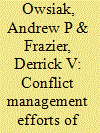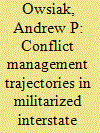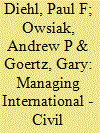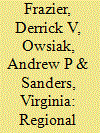|
|
|
Sort Order |
|
|
|
Items / Page
|
|
|
|
|
|
|
| Srl | Item |
| 1 |
ID:
133586


|
|
|
|
|
| Publication |
2014.
|
| Summary/Abstract |
Motivations for conflict management are rarely discussed in terms of commitments that potential third-parties have toward one or both disputants. The current study addresses this lacuna by examining how alliance designs affect conflict management behavior. Specifically, we argue that third-party states' willingness to manage interstate conflicts depends on both the existence and depth of an alliance relationship. We test this argument using data on conflict management within militarized interstate disputes during the period 1946-2000. We find that allies are more likely than non-allies to manage their partner's disputes. Underneath this aggregate relationship, however, we also find that the depth of alliance commitments strongly influences this behavior. Deeper commitments - both across and within alliance types - increase the likelihood of conflict management significantly
|
|
|
|
|
|
|
|
|
|
|
|
|
|
|
|
| 2 |
ID:
130929


|
|
|
|
|
| Publication |
2014.
|
| Summary/Abstract |
When multiple third parties intervene diplomatically in the same dispute, are their interventions interdependent? Although theoretical and empirical evidence suggests that they are, most conflict management research fails to theorize about and model this interdependence directly. The current project breaks with this tradition by advancing the new concept of a conflict management trajectory-the idea that conflict management efforts evolve over the course of a conflict and successive efforts inform one another. After discussing the rationale for and theoretical foundations underlying trajectories, I construct these trajectories empirically, summarize and discuss some of their characteristics, and create a typology to describe and organize them. In the process, I demonstrate that trajectories possess properties that clearly differentiate them from isolated interventions (the alternative) and display numerous general patterns. Each of these, in turn, suggests that trajectories deserve greater study as we seek to integrate and expand our understanding of international conflict management.
|
|
|
|
|
|
|
|
|
|
|
|
|
|
|
|
| 3 |
ID:
182561


|
|
|
|
|
| Summary/Abstract |
This study examines international-civil militarized conflicts (I-CMCs), those that lie at the intersection of violent intra- and interstate conflict. The data compilation identifies I-CMCs and the different conflict management approaches specifically used to manage them (i.e., negotiation, mediation, legal, peacekeeping, sanctions, and military intervention). We describe the patterns of conflict management in I-CMCs over the period 1946–2010, with respect to both serious civil and interstate conflicts. Among the key findings are that conflict management in general is very frequent (about 18 attempts per interstate confrontation and much more for serious internal conflict) and mediation is by far the most frequent approach.
|
|
|
|
|
|
|
|
|
|
|
|
|
|
|
|
| 4 |
ID:
133152


|
|
|
|
|
| Publication |
2014.
|
| Summary/Abstract |
Research on interstate mediation tends to assume (implicitly) that regional factors have little effect on the occurrence of mediation. We relax this assumption and advance an explicit regional theory of mediation in which regional ties create a type of bias that motivates both (potential) third parties to mediate conflicts within their region and disputants to select or accept these regional actors as mediators more frequently than non-regional actors. This bias first appears when states belong to the same region. In such situations, the potential third party and disputants likely understand one another better and share common security concerns. Yet regional membership does not explain the variation in mediation behavior within regions. To account for this, we argue that regionally more powerful states, as well as those that share (regional) institutional memberships with the disputants, have greater incentives to mediate than some regional counterparts. We empirically test the effect of these characteristics on the likelihood of mediation in militarized interstate disputes during the period 1946-2000. Our findings uncover support for our argument and suggest that accounting for regional bias is important in explaining mediation patterns in interstate conflict.
|
|
|
|
|
|
|
|
|
|
|
|
|
|
|
|
| 5 |
ID:
111740


|
|
|
|
|
| Publication |
2012.
|
| Summary/Abstract |
Can states usher in more peaceful relations with their neighbors by signing agreements that delineate their territorial boundaries? Theory suggests such a possibility, but the empirical evidence to date remains limited by research design and variable measurement decisions. After assembling a new data set on international boundary agreements, the current study conducts the first thorough test of this question during the period 1816-2001. The findings indicate that once neighboring states settle their borders, they are less likely to go to war or experience militarized interstate disputes with one another. These pacific effects persist across numerous time periods even after controlling for joint democracy, a characteristic that both theory and this analysis show to be positively related to settled borders. Through these findings, the study suggests that signing international boundary agreements can bring neighbors a more peaceful relationship with one another, regardless of the characteristics of their respective governmental regimes.
|
|
|
|
|
|
|
|
|
|
|
|
|
|
|
|
|
|
|
|
|